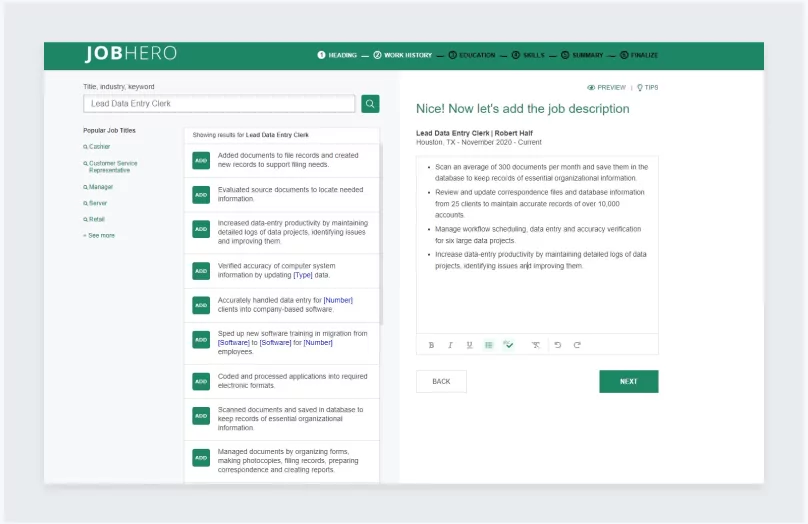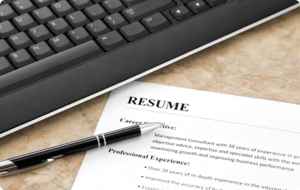- FEATURED IN :

The Importance of Communication Skills
Communication skills make the world a better place. They are essential for our personal growth and career success.
In the workplace, communication skills cultivate creativity, innovation, and teamwork. Companies rely on effective communicators for overall operational success.
Mentioning the communication skills you have will open career opportunities. Knowing how to present your credentials and qualifications effectively will increase your chances of landing a job and keeping it. The way you speak and act will help recruiters determine if you fit the role and company culture.
Overall, communication skills are an important part of our social and economic development. Whether it’s listening, writing, or speaking, these skills are key to help build trust, promote ideas, and increase productivity.
Types of Communication Skills
While communication is itself a type of skill, it can also be broken up into more specific skills that comprise a great communicator.
These skills refer to how you interact with others, including verbal, nonverbal and written. When combined correctly, they promote growth and performance. Here’s a breakdown of the three main types of communication:
Verbal
Verbal communication is what you say and how you say it out loud — ranging from the tone of your voice to what you say to how brief you keep your answers and how you respond to others. It’s how you speak out your feelings, thoughts, ideas and opinions.
To effectively communicate, you must speak clearly, balancing the volume, speed, and quality of words with annunciated syllables. However, the success of verbal communication relies heavily on being a good listener.
Nonverbal
Nonverbal communication is the message you transmit with your body. Your facial expressions, gestures, and posture can put people at ease or cause tension. For instance, if you say that you feel confident, but you’re slouched and not making eye contact, your body language says the exact opposite. Your listener will most likely feel that you’re not being honest.
Nonverbal communication can contradict or complement your message. When speaking, always stand straight and make sure to make eye contact.
Written
Written communication uses handwritten or typed text to explain or develop an idea. The ultimate goal is to form a connection between the reader and the writer. This could be for many different purposes: email, letter, report, proposal or brief.
To write effectively, keep it simple. Stay on topic and avoid information that is not relevant. The key is to write in a way that is organized and easy to follow. The tone should be friendly and professional.
Whether you are job hunting or flourishing in your career, use action verbs and industry-specific terminology to discuss ideas and accomplishments.
Well-written communication helps define goals and promotes integrity. It’s also key to identify problems and create solutions.
Top Communication Skills for Career Success
Listening
To be an effective communicator, you have to be a good listener. Even though it’s often overlooked, listening is a critical skill. During your interview, be fully attentive, and maintain eye contact. Keep your thoughts from wondering what you’re going to say next. Being an active listener shows respect and leads to meaningful results!
Nonverbal communication
Nonverbal communication such as body language, posture, and facial expressions are important during your job interview. Most candidates are so focused on preparing what they’re going to say that they overlook their posture and poise. Whether it’s an in-person or virtual interview, show confidence by sitting up straight and looking directly into the interviewer’s eyes. Employers will listen to your answers but they will also be reading your body language.
Clarity and concision
To communicate as clearly as possible, avoid being vague and redundant. Go straight to the point. Using a positive tone and a clear voice will demonstrate confidence.
Friendliness
Being polite and friendly creates a positive impact. During an interview, be genuine and cheerful. This will ensure that you are eager about the position and the company.
Confidence
Don’t be shy! Show what you have to offer with confidence. When speaking to the interviewer, focus on your qualifications. Always make eye contact and avoid fidgeting. Highlight your qualifications and work experience in a professional and friendly manner. Projecting confidence during your interview can be just as important as showing off your credentials.
Empathy
Talk less, listen more. This will help you understand the person’s point of view. When you provide your full attention, you make someone feel heard and respected. This creates an emotional connection.
Open-mindedness
How open are you in conversations? Judging others can create a significant communication barrier. Open-mindedness lets you recognize that the people you are listening to can contribute with valuable ideas and information.
Feedback
Feedback is the response of an audience to a message. It’s for measuring the effectiveness of your communication. It also helps you evaluate engagement.
Choosing the Right Medium
The best ideas can get lost if you do not pick the right medium. The medium is what gives life to the message. Whether it’s a social media post or part of a broadcast, picking the right medium depends on who the message is for. Be creative and engaging! Don’t let the audience miss the message.
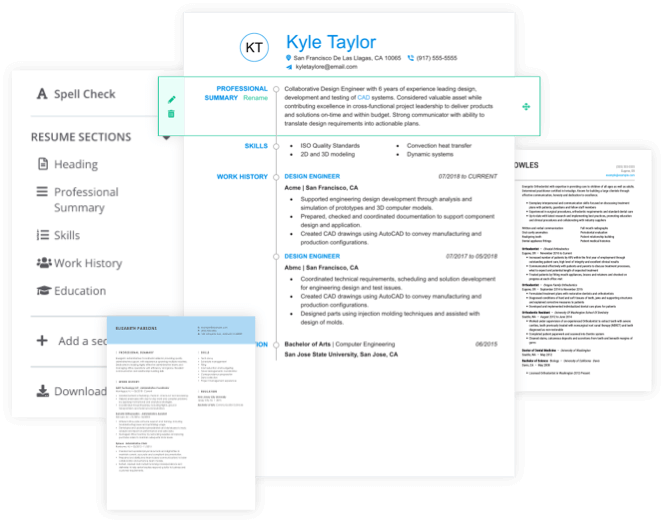
How to Make Your Communication Skills Stand Out
When it comes to job hunting, you can impress hiring managers with this potent mix of communication skills on your resume, cover letter and interview:
How to Showcase Communication Skills in Your Resume
Communication skills make you marketable to recruiters. The following skills can be applied to any position:
Negotiating
Recruiters look for candidates with patience, adaptability and the strategy of a negotiator. This is a strong skill set.
Leadership
Effective leaders speak clearly, listen to feedback, and motivate their team. Good leadership encourages productivity and passion. Leadership is part of the 12 Skills that are Relevant to Almost any Job.
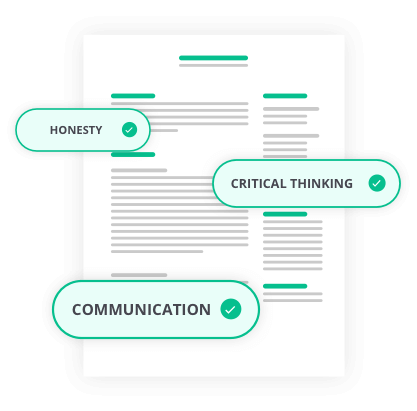
Virtual skills
Be ready to highlight your knowledge and experience of online and digital resources. With so many companies hiring remotely, the way we communicate virtually matters.
For a better idea of the way you can showcase your communication abilities in your resume, check out our full How to Write Skills Guide, it’s mighty helpful.
Better yet, check out JobHero’s Resume Builder because it auto suggests great skills surrounding leadership based on the job title that you are applying to! That can save you time, stress and missed job opportunities.
How to Showcase Communication Skills in Your Cover Letter
Use your cover letter to show off your communication skills. Use these skill sets to describe your top accomplishments.
For example: “Started a mentorship program impacting the deaf community. Successfully conducted virtual workshops with economic resources to over 100 participants.”
Of course, you can also make the cover letter writing process even easier on yourself by using JobHero’s Cover Letter Builder.
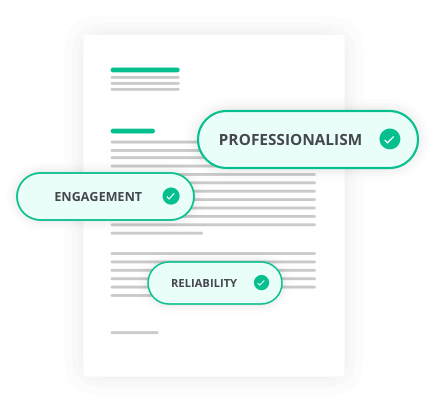
The builder is targeted to the exact job that you want and will auto suggest phrases and sentences that include some of the most relevant skills for that position.
Not only that, but the spell check and grammar functions will help ensure that you’re submitting a cover letter with the best possible writing practices!
How to Showcase Communication Skills During Your Interview
Listening
It's interview time, and you've prepared what you are going to say. You show that you are qualified by speaking of your accomplishments. But how do you show that you're listening? This is when body language comes in handy. Maintain eye contact. Be sure to nod as the interviewer speaks and avoid interruptions. Show that you are genuinely engaged in the conversation, by summarizing their key points or questions before answering. This simple trick will buy you time to organize your thoughts and avoid awkward silence.
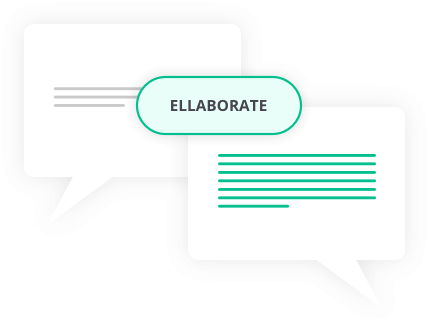
Verbal communication
Always be mindful of your tone of voice and pace. Having good communication skills can make a difference between landing the job or not. When speaking to hiring managers, be strategic. Highlight your accomplishments with numbers and quantifiable results. Speak as clearly as you can, and keep your tone upbeat.
To prepare even better, check out JobHero’s most commonly asked interview questions.
How to Improve Communication Skills
The success of your career relies on communication skills. It cultivates growth and progress.
Improving your communication skills should be an ongoing commitment. Let’s take a look at three ways you can improve your communication.
Listen. Harvard Business School says that knowing when to talk and when to listen is the key to being effective in conversation. Don’t be distracted by thinking about what you want to say next. Instead, take the time to pay attention. By doing so, you are communicating respect.
Engage. Great communicators ask questions, explore others’ ideas, and make an effort to understand different points of view. Avoid monologues or one-sided conversations. Make your audience part of the information flow by asking questions or obtaining their feedback. By doing so, you give people an opportunity to share their knowledge and express their opinions. This makes people feel valued and appreciated.
Body language. Don’t let your guard down. Body language is equally important. Maintain eye contact and good posture. Use your hands to emphasize key points but don’t overuse them or flail your arms –– you may come off as too intense. Being mindful of your body language will help build credibility and demonstrate complete confidence.
Communication between professionals is the key to career success. For more on skills, check out The 12 Most Important Skills to Consider When Writing a Resume.
Related Articles



